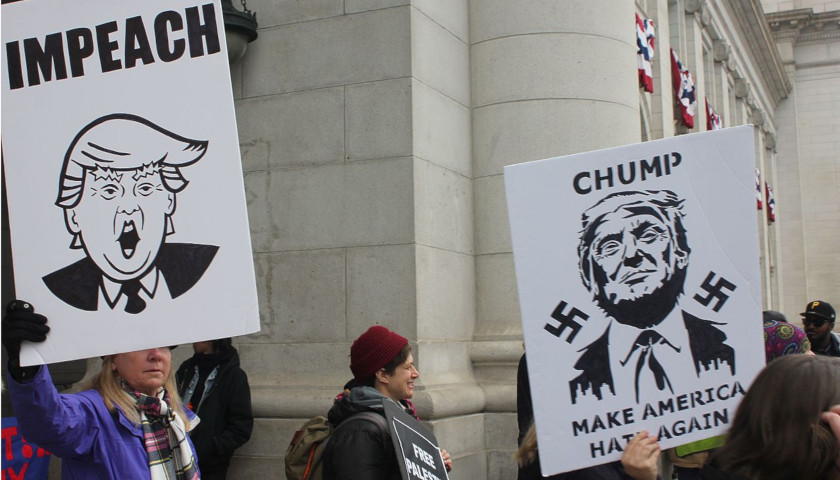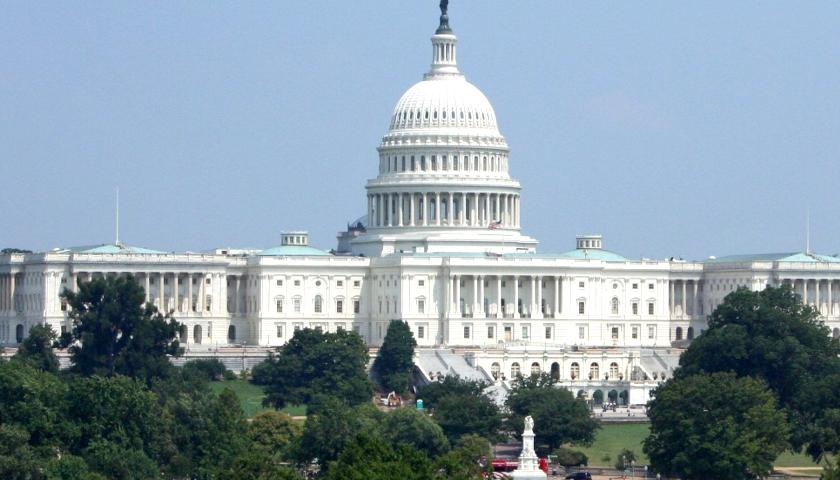by Stephen B. Presser
A push is underway for the Democrat-controlled House of Representatives to hold a vote on whether to impeach the Republican President Donald Trump. Of course, we have been through this before, but with a majority of Republicans voting to impeach President Bill Clinton, a Democrat. It takes only a majority in the House to bring articles of impeachment, which are similar to a grand jury indictment—they are the required first step in a two-step process.
Following a grand jury indictment, a criminal trial occurs, and a unanimous jury must bring in a guilty verdict for a conviction. Similarly, following impeachment, a two-thirds vote of the United States Senate is required to remove a president. Bill Clinton survived his impeachment because only half the members of the Senate supported his removal, with not a single Democrat voting in favor of it. It is likely that the impeachment effort to remove President Trump would fail in the Senate now controlled by Republicans, but there are some other similarities and differences between the two proceedings that deserve examination and comment.
First is the essential question about what the Constitution means when it provides in Article II, section 4 that an executive official “shall be removed” following impeachment and conviction for the commission of “treason, bribery, or other high crimes and misdemeanors.”
During the course of the Clinton proceedings, I was one among 19 scholars invited to explain to Congress the historical background and meaning of the impeachment clause. In my testimony, which Rep. Henry Hyde cited when he moved the articles against President Clinton, I said: “Impeachable offenses are those which demonstrate a fundamental betrayal of public trust. They suggest the federal official has deliberately failed in his duty to uphold the Constitution and laws he was sworn to enforce.”
Clinton was credibly accused of lying to a grand jury when he denied having a sexual relationship with Monica Lewinsky, of seeking to get witnesses to give false testimony in proceedings related to a civil suit brought against him by Paula Jones, and of attempting to conceal evidence in that case. He was, in other words, accused of perjury and obstruction of justice. This was criminal behavior that, according to federal judge Richard Posner (who wrote a book on the matter slyly called An Affair of State), would have gotten anyone else a sentence of three years in a federal penitentiary. The Republicans who brought the charges against Clinton argued that this commission of perjury and obstruction of justice in matters in which he was involved was done for personal selfish purposes, and was a betrayal of President Clinton’s presidential oath to “take care” that the laws be faithfully executed.
The scholars defending the president, most notably Cass Sunstein, then at the University of Chicago and now at Harvard (and later an influential figure in the Obama Administration), argued that just as it would be improper to impeach President Clinton for a traffic ticket, it was inappropriate to bring charges related, essentially, to matters unrelated to high affairs of state. The Constitutional clause, for Sunstein, ought to be reserved for cases in which the president had utterly ignored his duties to our country in order to serve the interest of some foreign power, or clearly put his own financial interests ahead of those of the nation. To seek to remove him for what amounted—at least in the eyes of his supporters—to lying about a sexual tryst, would weaken the presidency, thus hurting the constitutional scheme of separation of powers and equality of the three branches of government. Sunstein claimed that it was the purpose of elections to remove presidents who were politically unpopular and that impeachment simply should not be a tool of partisan politics.
The Best They’ve Got
Rashida Tlaib, the freshman congresswoman from Michigan who recently told a group from MoveOn.org that she couldn’t wait to “impeach the motherf—er,” unkindly referring to the sitting president, has published an op-ed in USA Today with activist John Bonifaz. Bearing the headline, “Now is the time to begin impeachment proceedings against President Trump,” the piece is happily devoid of any unsavory epithets. Rather, Tlaib and Bonifaz lay out exactly what they believe Trump has done that constitutes impeachable offenses, to wit:
obstructing justice; violating the emoluments clause; abusing the pardon power; directing or seeking to direct law enforcement to prosecute political adversaries for improper purposes; advocating illegal violence and undermining equal protection of the laws; ordering the cruel and unconstitutional imprisonment of children and their families at the southern border; and conspiring to illegally influence the 2016 election through a series of hush money payments.
The charge of “obstructing justice,” must have to do with the firing of FBI Director James Comey, an action well within the prerogatives of the president, and concurred in by a brace of former Justice Department officials. The charge of seeking to direct law enforcement to prosecute political adversaries must reflect the chants of “lock her up” directed at Hillary Clinton’s illegal use of a personal server for State Department business, and the “cruel and unconstitutional imprisonment of children,” appears to be the same quite legal activity of border enforcement undertaken by the Obama Administration.
The “hush money payments,” are the attempted non-disclosure agreements with purported pre-presidential paramours, but it is a stretch to find them to be illegal campaign contributions. I’m at a loss even to find a purported abuse of the presidential pardon power or a violation of the emoluments clause, which latter clause was conceived to apply to those in the pay of foreign governments, and not those simply doing business abroad.
More to the point, however, it is startling that we haven’t heard much from those who, like Sunstein, cautioned against using impeachment as a means to the purely political removal of the president, since that, after all, is precisely what Tlaib and her allies in the House seek to do. #TheResistance simply has never accepted the Electoral College result in the 2016 Presidential election, and the impeachment of President Trump is their seeking a second bite at that apple. Surely, if the attempt to remove President Clinton was wrongly and politically-motivated so is this one.
Questions of Character vs. Disputes over Policy
In fairness to Tlaib and her colleagues, however, it is appropriate to seek to remove a president devoid of character, and willing to pervert the prerogatives of his or her office for personal financial or political gain at the expense of the nation or the performance of his or her required duties. I do believe that fairly characterizes President Clinton and what he did when he sought by shameful means to avoid liability to Paula Jones.
In President Trump’s case, however, all of the litany of complaints that have been lodged against him actually seem to be connected to his efforts to fulfill his campaign promises to end the divisive politics of the Obama years, and to reverse the harmful regulation, excessive taxation, and lax immigration policies of the last administration. Trump’s critics, such as Tlaib and Bonifaz, should acknowledge that their disagreement with the president is really about his policies and politics, not his character.
Controversies over political and policy matters are supposed to be settled by the election coming up in 2020, not by impeachment. Sunstein and other defenders of President Clinton ought to remind those seeking the impeachment of President Trump that they are engaged in undermining the very Constitution they claim to venerate.
– – –






Presser is spot on. Imagine if A Republican President has pulled what Bill Clinton has in the #metoo era. Would the outcome change?